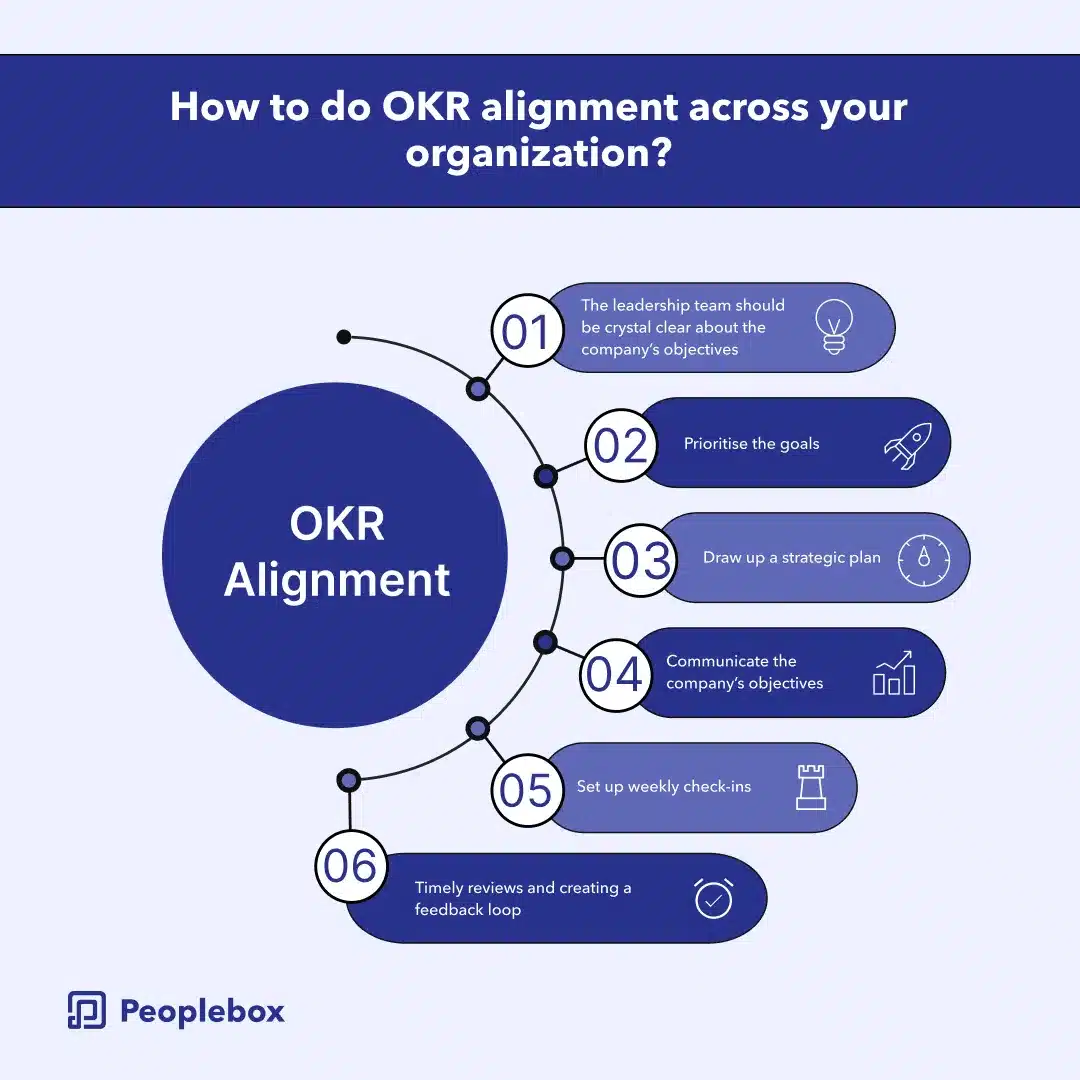
When going through the annual reports, have you noticed that the mentioned “achievements” do not fall under the larger company objectives?
Have you wondered what we could do to cascade the company objectives to every vertical, horizontal and diagonal of the organization?
OKR alignment can help in creating transparent goals and provide clarity to teams as they work towards larger company objectives. There is high employee engagement, as they feel committed and motivated to work when aligned with larger company objectives.
This will ensure the company achieves the expected outcome and pave the way to the overall growth of the company.
Why is OKR alignment important for employee, team and organizational goals?

A company with clear objectives, goals and an action plan is on to a good start. But if the objectives and goals are unclear at the department, team or individual level, the results will not be as expected.
To achieve the set objectives and goals, everyone, at all levels of the company, must know and understand them.
OKR management platforms like Peoplebox help you set OKRs with visibility across the organization, to ensure transparency and accountability. See it in action below.
1 Better resource utilization
When time and resources are spent on projects aligned with the company objectives, it reduces unnecessary expenses and increases profitability. There is also a considerable improvement in customer experience as they are presented with top quality products, in turn resulting in the organization’s growth.
2 Promotes accountability
When employees understand how their actions are contributing to the overall company objectives, it will inculcate a sense of responsibility and accountability. Satisfied employees mean an increase in employee retention rates.
OKR Software - Used by 500+ Companies
Transform your managers into leaders through personalized coaching, bite-size learnings and make it super easy for them to have meaningful 1:1s, check-ins, and align goals(OKRs).
OKR Software - Rated 4.8 on G2
Empower your managers to be a better leader with essential performance tools & personalized coaching support.
3 Clear action plan
Unclear goals will lead to unclear actions, but when teams and individuals are clear on what to achieve, they have a better understanding of what they should do. They become capable of prioritising and categorising their day-to-day tasks.
4 Employees are focused and committed to the company’s objectives
Everyone working towards the same objectives and goals will ensure that they achieve what they set out for. Unclear actions will cause inefficient time utilization and wastage of effort.
How to do OKR alignment across your organization?

1. The leadership team should be crystal clear about the company’s objectives.
The top management should come together and conceptualize the company’s future vision- the objectives. Determine WHAT needs to be done to turn this vision into reality – the goals that matter the most. It should be challenging, achievable, concise, specific and inspirational. Vague goals will give you results, just not what you were aiming for.
2. Prioritise the goals.
The order of execution is as important as the execution itself. So, once you have the list of goals, ask yourself, ‘What are the most important goals amongst these?’ and re-order the list of goals according to it.
OKR Software - Used by 500+ Companies
Transform your managers into leaders through personalized coaching, bite-size learnings and make it super easy for them to have meaningful 1:1s, check-ins, and align goals(OKRs).
OKR Software - Rated 4.8 on G2
Empower your managers to be a better leader with essential performance tools & personalized coaching support.
3. Draw up a strategic plan.
With the final list of goals ready, the next step is to communicate it to the department, team and individual levels. Before doing that, let’s face the fact that people do not have the patience to read paragraphs after paragraphs.
To ensure the hard work put in by the top management is not in vain, it would be ideal to come up with a one-page strategic plan which covers the core values, purposes, business objectives, goals, actions and accountability or use professional software to do it for you.
4. Communicate the company’s objectives.
Once the strategic plan is in place, it’s time to communicate the contents of the plan to the senior management and middle management. They need to understand these goals to communicate them to the various departments, teams, and individuals.
Note: The tone and nature of communication should be consistent across the verticals, horizontals and diagonals of the company so that everyone is on the same page and moving towards the same goals.
5. Set up weekly check-ins.
To align teams to the company’s objectives, managers must have regular check-ins with their direct reporters to track progress, discuss the objectives, and how to align their personal goals with the company’s objectives.
Constantly and consistently exposing the employees to the objectives will reinforce and re-align the employees towards them. It also reduces the possibility of employees, teams and departments steering away from the set objectives.

6. Timely reviews and creating a feedback loop.
Set up monthly or quarterly reviews depending on what suits your company. These reviews will help in detecting things that are not working early on. It will prevent teams and individuals from steering off course. Also, managers should regularly provide and seek feedback from their direct reporters during the check-ins.
Best Practices to Maintain OKR Alignment Across the Company
- Schedule team status update meetings after the release and implementation of the objectives and goals. These meetings can be conducted on a weekly or bi-weekly basis to exclusively discuss the company objectives and goals.
- Develop a mentor-mentee relationship between managers and employees so that they are comfortable and confident in sharing their feedback.
- Encourage collaboration among teams that have similar team objectives. This will help to manage time efficiently and also build a good rapport amongst the teams.
- Send out clear communication in case any changes are made to the company objectives after reviewing them over the following quarter. Ensure everyone agrees and understands the changes.
- Choose the right tools for implementing the objectives. This will ensure transparency across all levels of the organization, which will increase the success rates.
Conclusion

Aligning the company objectives is the key to achieving overall growth in the desired time frame. It is not a one time task, rather; it is a continuous process that will create a goal-driven, high performing environment. Also, with departments, teams and individuals aligned to the company’s OKRs, there is a considerable decrease in misdirected efforts and an increase in the quality of work that is being delivered.






